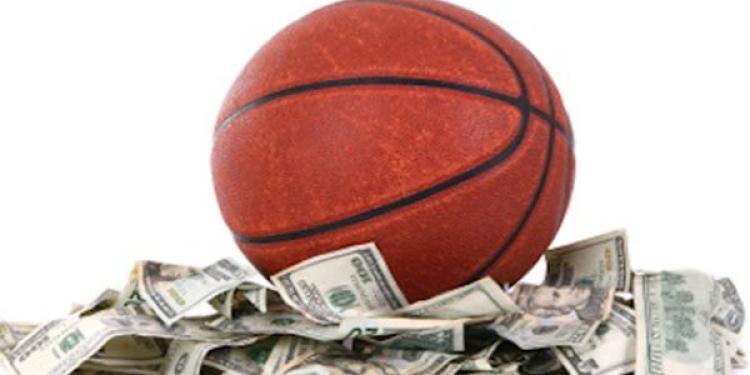7 Worst Scandals in March Madness History
Posted: March 16, 2014
Updated: October 4, 2017

The game of basketball has not always been able to keep its nose clean.
Like other sports, the beautiful game of basketball has been at times sullied with the stain of scandal. While we hope you know how to bet on March Madness legally, there have been cases of gamblers and bookies breaking the law in order to get better odds. Notable incidents have involved everything from academic fraud to illegal payments to players to point-shaving to match-fixing. We’ll take a look at the most shameful cases in history.
Point-shaving in New York
Many older Americans remember the Eisenhower years as the “good ol’ days,” a simpler time when the country was strong and unified. But the decade had a dark side, and we aren’t talking about McCarthyism. In 1951 three bookmakers and convicted felons, Cornelious Kelleher and brothers Benjamin and Irving Schwartzberg, were arrested on bribery and conspiracy charges in New York City. Their specific crime was offering bribes to participants in sporting events, a violation of the State of New York and American gambling laws.
• Major scandals have included point-shaving, match-fixing, academic fraud and illegal payments to players
• The University of Michigan was forced to vacate its Final Four trophies from 1992 and 1993; and Minnesota its Final Four trophy from 1997
• 1951 national champion City College of New York was implicated in a large point-shaving and match-fixing scandal
A story quickly broke that the bookies had paid $5,000 to Henry Poppe and Jack Byrnes, two players on the City College of New York (CCNY) basketball team. Poppe and Byrnes accepted the money in exchange for altering the point-spread of several games over the previous three years. Byrnes was also charged in 1951 for “throwing” games during the 1949-50 season.
CCNY had won the NCAA tournament in 1950, marking the first time a March Madness champion had its success called into question. Despite the scandal the school was allowed to keep its title as it did not cheat in order to give it an advantage in games; players merely shaved points. However, it is still remembered as one of the worst incidents in the history of the sport.
Academic fraud at Minnesota
In 1997 the University of Minnesota Golden Gophers advanced to the Final Four teams at the March Madness tournament. It was the best performance in the school’s long history, capping off a decade of uninterrupted success. But the euphoria was short-lived, as a scandal invalidated the accomplishment just two years later. In 1999 university employee Jan Gangelhoff came forward claiming that she had been paid to write roughly 400 term papers for players over a span of several years. Coach Clem Haskins admitted to paying Gangelhoff $3,000.
The school had to vacate its 1997 Final Four trophy, and its official record for that season now stands at 0-0. Luckily for those who legally bet on March Madness they still received their payouts. Haskins lost his job and was banned from coaching for life by the NCAA, but walked away with a plush $1.5 million buyout.
The Fab 5 wiped from the record books
During the early 1990s the University of Michigan captured the limelight with the “Fab 5,” a star-studded roster featuring future pro players Chris Webber, Jalen Rose and Juwon Howard. They overwhelmed opponents with superior talent and reached the Final Four at March Madness in 1992 and 1993.
But their success came at the expense of integrity, and in the end their accomplishments turned to dust. The crime couldn’t have been worse in the eyes of NCAA authorities: players were paid cash in exchange for playing at Michigan, which is not only a violation of NCAA rules but illegal according to state and federal law. Chris Webber told a federal court that he received $38,200 in cash from Ed Martin, a prominent donor to the University of Michigan. Martin claimed that he had given Webber $280,000.
News of wrongdoing did not break until 1997 and it took several years to unravel the depth of the scandal. Coach Steve Fisher was fired in 1997 (although he escaped criminal charges) and the school was forced to vacate its Final Four trophies and all other achievements during the 1990s. In 2002 the official record of Michigan basketball from 1992-1993 and 1995-1999 was wiped clean.
Kentucky’s tarnished crown
The University of Kentucky is mythologized as basketball royalty, and with good reason: its eight March Madness championships rank only behind the University of California-Los Angeles in the record books. Its legendary coach Adolph Rupp is remembered as one of the most brilliant minds in the history of the sport. But during his long and successful run as coach, Kentucky was implicated in one of the worst gambling scandals in basketball history.
The Kentucky Wildcats won the NCAA tournament championship in March 1951. Later that year three players Alex Groza, Ralph Beard and Dale Barnstable were arrested for accepting money to shave points during the 1949-50 season. Rupp was not accused of having been involved with the scandal, but it came out that the school had illegally given money to players and allowed ineligible players to compete. Kentucky was forced to sit out the 1952-53 season, the first time the NCAA ever imposed the “death penalty” on an athletic program.
Beard and Groza lost their chances at pro careers, both being given a lifetime ban from the sport. Rupp was able to keep his job (being a championship-winning coach had its perks at the time), and Kentucky won the national championship in 1954, finishing with a perfect 29-0 record.












